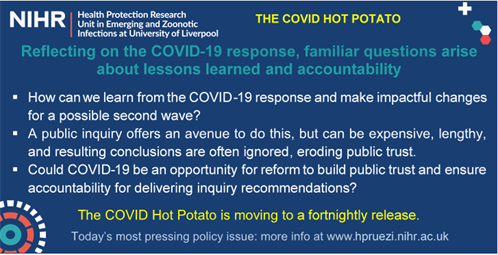The COVID Hot Potato 8
Thu, 11 June 2020

This week: As the UK COVID-19 response transitions from crisis management to a longer-term strategy, we look at evidence submitted to the Select Committee inquiry by Prof Sally Sheard. This draws on analyses of previous epidemics to evaluate the utility of a public inquiry after COVID-19, and highlights the need for reform to ensure that inquiry recommendations are implemented.[1]
Up to six different departments, agencies and public bodies, have been involved in the COVID-19 response in the UK. This has contributed to poor communication, delays to action, and weak accountability. Frontline health professionals have been directly impacted and lessons must be learned to properly prepare for a potential second wave.
The 2009 H1N1 pandemic provides a useful policy comparison with COVID-19 and highlights familiar issues. During the H1N1 pandemic, local and national leadership in the UK was criticised regarding plans for school closures, use of algorithms to predict the epidemic curve, and differing views on how to communicate to the public epidemic trends and response measures. Systemic failures in public health planning, delivery, and leadership appear to have since gone unaddressed.
A public inquiry is a major government-led investigation into a particular area of “public concern”, primarily in order to “prevent reoccurrence.”[2] Post-crisis/scandal/incident inquiries have become a standard UK government response, driven by a range of motivations from identifying system failures to appeasing public concern. While this seems to offer an important avenue for evaluating the COVID-19 response, between 1990 and 2017 there were 68 major public inquiries, costing over £638 million.
Many of the reforms recommended by inquiries are ignored. Similarly, there is no mechanism for monitoring the implementation or progress of inquiry recommendations and reforms. There is no evidence that inquiries are effective or efficient use of resources. There has also been no effort to understand and improve the inquiry process (e.g. how to structure, schedule, staff, report). These systemic failures erode public trust.
Any COVID-19 inquiry must therefore be carefully justified and constructed, with mechanisms for accountability that may contribute to increasing public trust. As the COVID-19 response moves into the next phase, the potential for significant local variation in demand and capacity means that local government authorities and Directors of Public Health will be critical for leading and implementing strategies. Historical analysis demonstrates the value of local synergies between NHS, social care, and public health systems. Restoration of effective networks and adequate budgets must be at the heart of COVID-19 planning.
While public inquiries have provided opportunities to identify lessons in previous epidemic responses, there is little evidence that measures to address change have been implemented. There is a clear pattern in UK government of failure to learn, either from historical precedents or from the expensive inquiries conducted subsequent to crises. COVID-19 is therefore an opportunity to systematise and monitor the implementation of inquiry recommendations.
_____________________________
NOTE: The NIHR Health Protection Research Unit in Emerging and Zoonotic Infections brings together internationally leading researchers from the University of Liverpool, University of Oxford, Liverpool School of Tropical Medicine, and Public Health England.
We are conducting an MRC-Funded project to understand the dynamics of policy development and healthcare professionals’ behaviour in the UK during the COVID-19 pandemic. We have a targeted panel of healthcare professionals, with whom we regularly speak, to capture their experiences and reactions over the course of the outbreak. They include clinical leads, junior doctors, and nurses in HCID units, Emergency departments, intensive therapy units, medical wards, neonatal units and GP surgeries.
We have previously identified emerging issues around PPE challenges, the need for testing of healthcare professionals, and the need for mental health support for staff on the frontline, all of which were fed back to Government Advisory Panels, and proved to be important in decision-making.
If you’d like to contact the HPRU EZI, you can email hpruei@liverpool.ac.uk or call 0151 795 9626.
[1] Written evidence submitted by Professor Sally Sheard, Head of Department, Public Health, Policy and Systems, University of Liverpool (DEL0267) https://committees.parliament.uk/writtenevidence/4624/html/
